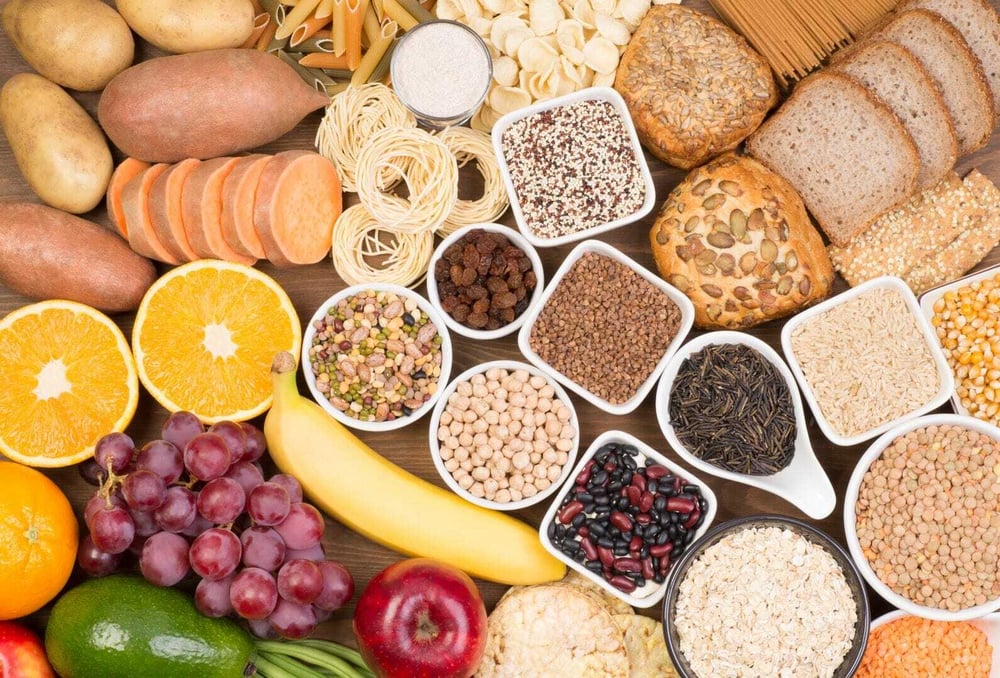COMPLEX CARBS FOR SUSTAINED ENERGY
fitness Nutrition Mindset Sep 9, 2025 1:06:13 PM Kyle Receno 7 min read

Complex carbohydrates are nutrient-dense foods that provide long-lasting energy by releasing glucose slowly into the bloodstream. Unlike simple carbs, which cause quick energy spikes and crashes, complex carbs support sustained performance, making them ideal for athletes, busy professionals, or anyone seeking consistent energy. This blog explores the science behind complex carbs, their benefits for sustained energy, and practical ways to incorporate them into your diet.
Why Complex Carbs Provide Sustained Energy
Complex carbohydrates have longer molecular chains than simple carbs, taking longer to break down into glucose. This slow digestion ensures a steady release of energy, stabilizing blood sugar and preventing fatigue. Rich in fiber, vitamins, and minerals, complex carbs also support digestion, recovery, and overall health, making them a cornerstone of an energy-focused diet.
Key Benefits:
- Sustained Energy: Prevents energy crashes with gradual glucose release.
- Improved Endurance: Fuels prolonged physical or mental activities.
- Better Recovery: Replenishes glycogen stores post-workout.
- Enhanced Satiety: High fiber content promotes fullness and reduces overeating.
- Nutrient Density: Provides vitamins, minerals, and antioxidants for health.
Top Complex Carb Sources
Below are complex carb-rich foods for sustained energy, their nutritional profiles, and how to incorporate them into meals.
1. Quinoa
Nutrition: 40g carbs, 14g protein, 6g fiber per cooked cup (185g).
- Why It Helps: Complete protein and high fiber for steady energy and muscle support.
- How to Use: Use as a base for bowls with veggies and protein, or in salads.
- Serving: 1 cup cooked, 2–3 times per week.
2. Sweet Potatoes
Nutrition: 26g carbs, 2g protein, 4g fiber per medium potato (130g).
- Why It Helps: Rich in fiber and vitamin A, supports sustained energy and recovery.
- How to Use: Roast, mash, or slice into fries; pair with lean protein.
- Serving: 1 medium potato, 3–4 times per week.
3. Oats
Nutrition: 27g carbs, 5g protein, 4g fiber per ½ cup dry (40g).
- Why It Helps: Slow-digesting carbs and fiber for morning energy and satiety.
- How to Use: Make oatmeal with fruit and nuts, or use in energy bars.
- Serving: ½–1 cup dry, daily for breakfast or snacks.
4. Brown Rice
Nutrition: 45g carbs, 5g protein, 4g fiber per cooked cup (195g).
- Why It Helps: Provides steady energy and B vitamins for metabolism.
- How to Use: Pair with lean protein and veggies for balanced meals.
- Serving: ¾–1 cup cooked, 2–3 times per week.
5. Lentils
Nutrition: 40g carbs, 18g protein, 16g fiber per cooked cup (200g).
- Why It Helps: High fiber and protein for prolonged energy and muscle repair.
- How to Use: Add to soups, salads, or make lentil patties.
- Serving: ¾–1 cup cooked, 2–3 times per week.
Sample Meal Plan for Sustained Energy
This plan for a 70-kg individual with moderate activity (~2,000–2,400 calories) incorporates complex carbs for consistent energy:
- Breakfast: Oatmeal (½ cup dry oats, ½ cup berries, 1 tbsp almond butter) – 350 calories, 40g carbs, 10g protein, 12g fat.
- Snack: Apple with ¼ cup cooked quinoa mixed with yogurt – 200 calories, 30g carbs, 5g protein, 3g fat.
- Lunch: Grilled chicken (4 oz) with 1 cup brown rice and 1 cup steamed broccoli – 500 calories, 50g carbs, 30g protein, 10g fat.
- Snack: Roasted sweet potato (1 medium) with a sprinkle of cinnamon – 150 calories, 26g carbs, 2g protein, 0g fat.
- Dinner: Lentil soup (1 cup lentils, mixed veggies) with a whole-grain roll – 450 calories, 60g carbs, 20g protein, 8g fat.
- Total: ~1,650 calories, 206g carbs, 67g protein, 33g fat (adjust with additional snacks or portions for full calorie needs).
- Hydration: 50–70 oz water daily (0.7–1 oz/kg body weight).
Tips for Success
- Balance with Protein and Fats: Pair complex carbs with protein (1.6–2.2g/kg) and fats (0.8–1g/kg) for optimal energy and recovery.
- Time Carbs Strategically: Consume 1–2 hours before workouts or throughout the day for steady energy.
- Choose Whole Foods: Prioritize minimally processed carbs (e.g., quinoa over white rice) for nutrient density.
- Prep in Advance: Cook grains or legumes in bulk for easy meal assembly.
- Monitor Portions: Aim for 4–6g carbs/kg body weight daily, adjusted for activity level.
Common Mistakes to Avoid
- Over-Reliance on Simple Carbs: Avoid sugary snacks or refined grains that cause energy crashes.
- Skipping Fiber: Low-fiber carbs (e.g., white bread) digest too quickly; choose high-fiber options.
- Unbalanced Meals: Pair carbs with protein and fats to avoid blood sugar spikes.
- Overeating Carbs: Excess portions can lead to sluggishness; stick to recommended servings.
Who Can Benefit?
Complex carbs for sustained energy are ideal for:
- Athletes: Fuels endurance and strength training with steady energy.
- Busy Professionals: Maintains focus and productivity during long workdays.
- Students: Supports mental stamina for studying or exams.
- Active Individuals: Enhances energy for daily tasks or recreational activities.
Additional Considerations
- Micronutrients: Choose colorful carbs (e.g., sweet potatoes, berries) for vitamins and antioxidants.
- Allergies: Substitute gluten-free options (e.g., quinoa, rice) if sensitive to grains.
- Consult a Dietitian: Tailor carb intake for specific needs or medical conditions.
Conclusion
Complex carbs like quinoa, sweet potatoes, and lentils provide sustained energy through slow-digesting, nutrient-dense sources. By incorporating these foods into a balanced meal plan, you can maintain performance, prevent fatigue, and support recovery. Start with the sample plan and adjust to your needs for consistent energy and health.
Disclaimer: Consult a dietitian or healthcare provider before making dietary changes, especially if you have medical conditions or dietary restrictions.
